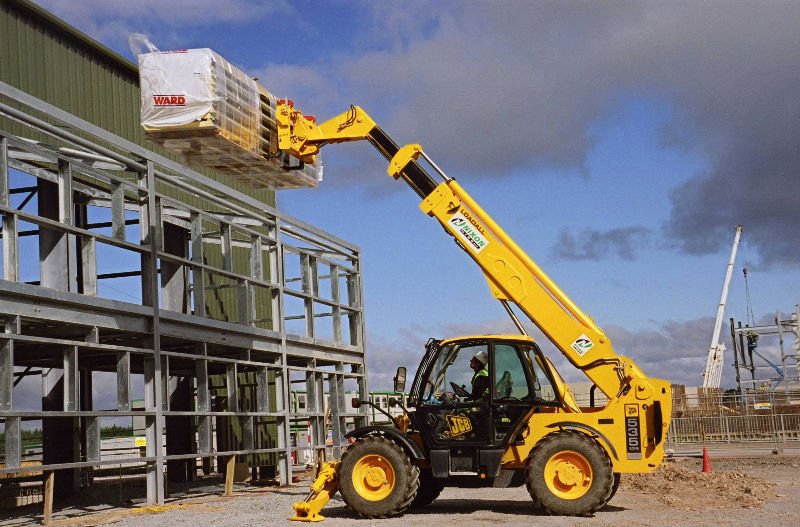Equipment for Construction About
Source: (Google.com.pk)
It has been as gradual as a sunrise, but finally it has dawned on equipment-owning organizations that the position of equipment manager is much more than the care and feeding of machines.
A number of factors have shifted the paradigm, including better-built and more sophisticated equipment coming off the production line of original equipment manufacturers, technology innovations that make troubleshooting easier and quicker, advanced oil analysis from laboratories, and improved management system software. The list goes on, but the primary reason for the rising star of the equipment manager is the dramatic change in responsibility.
Louis V. Marino, vice president of equipment operations for Yonkers Contracting Co., has witnessed these changes firsthand. He is responsible for a fleet of 750 pieces of on- and off-highway equipment with a replacement value of $75 million.
Another vice president of equipment, Lew Love, also knows how important equipment managers have become to organizations, such as his own company, James Construction Group in Baton Rouge, La. James Construction is a regional contractor that has most of its business in Florida, but also serves Louisiana, Arkansas and Mississippi. About 70 percent of the work is heavy highway construction and 30 to 40 percent is industrial, such as chemical.
“It is essential that equipment managers be integrated into the organization,” Love says. “One reason is that many companies have a large portion of their net worth tied up in assets. That is a huge responsibility. Equipment managers have to make sure those assets are maintained properly and disposed of at the proper time. More important, the manager must properly purchase the equipment at the beginning of its life cycle.”
The second reason the asset manager is essential to the company is the key role he plays in garnering new work. “All companies are about going out and earning new business,” Love says. “Equipment can be a huge part of that. Companies are beginning to realize and appreciate innovative and new ways of approaching rate structures and cost allocations, and being aggressive in capturing new work.”
The new breed of equipment managers brings quite a bit to the corporate table. By astute management of the fleet, they maximize the value of the construction company, says Love. They minimize cost at the project level, no matter how that cost is measured: hours, cubic yards, time, whatever yardstick is chosen, he says.
“Minimizing project cost allows the company to go out and be as aggressive as it possibly can in securing new business,” Love says.
Earning corporate appreciation and respect starts with “buying right” when it comes to the machines purchased, Love says. And that must be done for each application. “You have to make sure you buy the right product that returns the best value to the company,” he says. “And that involves the local dealer and the manufacturer to keep pricing competitive.”
There are no uniform rules that apply when determining what equipment is best. “Every situation is different,” he says. “Your geographic footprint can dictate equipment selection, such as the quality of the dealers in your region. You have to make sure you have quality support in areas where you move equipment around. If not, you have to make sure that your own organization is ready from the ground up to pick up the slack.”
In Love’s case, for example, rocky terrain really isn’t a factor at most of his job sites, “so bucket capacity is more of a consideration than the heavy-duty nature of the stick and bucket as it would be if we were working in a lot of rock,” he says.
The majority of dozers in his fleet, for instance, are low ground pressure (LGP) machines. “We work in poor under-foot conditions, so a low ground pressure machine is a better fit,” he says.
Love’s fleet management abilities were called into play when Hurricane Katrina zeroed in on Louisiana. “We knew that the third-party dump truck companies that we depended on to haul our materials for us would be chasing hurricane-related work, mostly in New Orleans,” Love says. “We all met in the conference room the day after Katrina hit and decided to go out and buy our own dump trucks. We were able to do that in a short period of time with the support of our local dealers.”
Within two weeks, James Construction Group owned a fleet of 20 dump trucks, thanks to Love’s industry knowledge. “This is a relations-based business,” he says. “Having good relationships with people you count on places you in a position of getting things done when you need to get them done. Of course, you have to continue checking to make sure you get quality work, and good pricing on parts and service. But at the end of the day, it is the relationship you develop with suppliers and vendors. And that is the critical part of the process.”
Based on his 25 years in the business, there is no question that the corporate view of equipment professionals has changed, Love says. “An equipment manager used to be perceived as a necessary evil, a person who made sure the oil was changed. Now he occupies a critical box on the organizational chart. Upper management, including CEOs and CFOs, realize the value of equipment managers and want to make sure they have the right person in that position. They have a lot of money tied up in that equipment.”
Climbing toward the summit of an organization isn’t an easy job, Marino says. “You have to have knowledge. And people are an extraordinary fountain of knowledge. You have to educate yourself about every aspect of the industry you work in. You learn and you grow and hopefully good things happen.
 Equipment for Construction
Equipment for Construction
 Equipment for Construction
Equipment for Construction
 Equipment for Construction
Equipment for Construction
 Equipment for Construction
Equipment for Construction
 Equipment for Construction
Equipment for Construction
 Equipment for Construction
Equipment for Construction
 Equipment for Construction
Equipment for Construction
 Equipment for Construction
Equipment for Construction
 Equipment for Construction
Equipment for Construction
 Equipment for Construction
Equipment for Construction
 Equipment for Construction
Equipment for Construction
 Equipment for Construction
Equipment for Construction
 Equipment for Construction
Equipment for Construction
 Equipment for Construction
Equipment for Construction
Source: (Google.com.pk)
It has been as gradual as a sunrise, but finally it has dawned on equipment-owning organizations that the position of equipment manager is much more than the care and feeding of machines.
A number of factors have shifted the paradigm, including better-built and more sophisticated equipment coming off the production line of original equipment manufacturers, technology innovations that make troubleshooting easier and quicker, advanced oil analysis from laboratories, and improved management system software. The list goes on, but the primary reason for the rising star of the equipment manager is the dramatic change in responsibility.
Louis V. Marino, vice president of equipment operations for Yonkers Contracting Co., has witnessed these changes firsthand. He is responsible for a fleet of 750 pieces of on- and off-highway equipment with a replacement value of $75 million.
Another vice president of equipment, Lew Love, also knows how important equipment managers have become to organizations, such as his own company, James Construction Group in Baton Rouge, La. James Construction is a regional contractor that has most of its business in Florida, but also serves Louisiana, Arkansas and Mississippi. About 70 percent of the work is heavy highway construction and 30 to 40 percent is industrial, such as chemical.
“It is essential that equipment managers be integrated into the organization,” Love says. “One reason is that many companies have a large portion of their net worth tied up in assets. That is a huge responsibility. Equipment managers have to make sure those assets are maintained properly and disposed of at the proper time. More important, the manager must properly purchase the equipment at the beginning of its life cycle.”
The second reason the asset manager is essential to the company is the key role he plays in garnering new work. “All companies are about going out and earning new business,” Love says. “Equipment can be a huge part of that. Companies are beginning to realize and appreciate innovative and new ways of approaching rate structures and cost allocations, and being aggressive in capturing new work.”
The new breed of equipment managers brings quite a bit to the corporate table. By astute management of the fleet, they maximize the value of the construction company, says Love. They minimize cost at the project level, no matter how that cost is measured: hours, cubic yards, time, whatever yardstick is chosen, he says.
“Minimizing project cost allows the company to go out and be as aggressive as it possibly can in securing new business,” Love says.
Earning corporate appreciation and respect starts with “buying right” when it comes to the machines purchased, Love says. And that must be done for each application. “You have to make sure you buy the right product that returns the best value to the company,” he says. “And that involves the local dealer and the manufacturer to keep pricing competitive.”
There are no uniform rules that apply when determining what equipment is best. “Every situation is different,” he says. “Your geographic footprint can dictate equipment selection, such as the quality of the dealers in your region. You have to make sure you have quality support in areas where you move equipment around. If not, you have to make sure that your own organization is ready from the ground up to pick up the slack.”
In Love’s case, for example, rocky terrain really isn’t a factor at most of his job sites, “so bucket capacity is more of a consideration than the heavy-duty nature of the stick and bucket as it would be if we were working in a lot of rock,” he says.
The majority of dozers in his fleet, for instance, are low ground pressure (LGP) machines. “We work in poor under-foot conditions, so a low ground pressure machine is a better fit,” he says.
Love’s fleet management abilities were called into play when Hurricane Katrina zeroed in on Louisiana. “We knew that the third-party dump truck companies that we depended on to haul our materials for us would be chasing hurricane-related work, mostly in New Orleans,” Love says. “We all met in the conference room the day after Katrina hit and decided to go out and buy our own dump trucks. We were able to do that in a short period of time with the support of our local dealers.”
Within two weeks, James Construction Group owned a fleet of 20 dump trucks, thanks to Love’s industry knowledge. “This is a relations-based business,” he says. “Having good relationships with people you count on places you in a position of getting things done when you need to get them done. Of course, you have to continue checking to make sure you get quality work, and good pricing on parts and service. But at the end of the day, it is the relationship you develop with suppliers and vendors. And that is the critical part of the process.”
Based on his 25 years in the business, there is no question that the corporate view of equipment professionals has changed, Love says. “An equipment manager used to be perceived as a necessary evil, a person who made sure the oil was changed. Now he occupies a critical box on the organizational chart. Upper management, including CEOs and CFOs, realize the value of equipment managers and want to make sure they have the right person in that position. They have a lot of money tied up in that equipment.”
Climbing toward the summit of an organization isn’t an easy job, Marino says. “You have to have knowledge. And people are an extraordinary fountain of knowledge. You have to educate yourself about every aspect of the industry you work in. You learn and you grow and hopefully good things happen.
Equipment for Construction














No comments:
Post a Comment